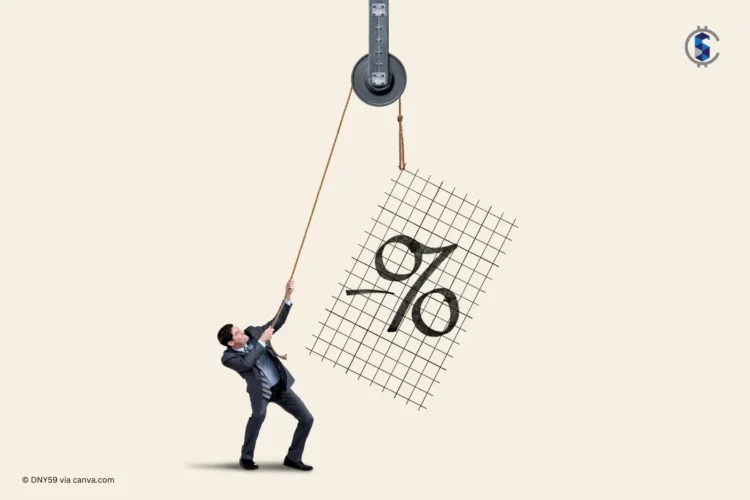
In today’s dynamic economic landscape, understanding inflation and interest rates is paramount. With platforms like SafeRE creating a revolution in the real estate investment scene, it is crucial for accredited investors and asset managers to understand how changes in the economic and global stage drive investment decisions. This guide shares fundamentals you must know about the impact of interest rates and inflation in the global economy and on your investment decisions.
Understanding Inflation
Inflation is akin to a silent tax on consumers. As the cost of goods and services rises, the purchasing power of money diminishes. Over time, this means that a dollar today might not buy as much as it did a year ago. Interest rates and inflation are intricately linked, influencing the actual cost of borrowing and return on investments. This relationship gives rise to the concepts of nominal and real interest rates.
Nominal Vs. Real Interest Rates
Nominal and real interest rates are pivotal concepts in the financial world, each offering a unique perspective on the cost of borrowing and the return on investments. The nominal interest rate, often advertised by banks and financial institutions, represents the stated rate of return without adjusting for inflation. On the other hand, the real interest rate provides a clearer picture by accounting for inflation, reflecting the actual cost or yield of funds. Importantly, if the nominal interest rate that banks pay for deposits is below the inflation rate, then the real interest rate is negative, and the value of cash holdings declines.
This distinction is crucial as it helps investors and borrowers gauge their true earning or borrowing potential, especially in fluctuating economic climates. For real estate investors, understanding inflation is crucial as it can impact property values, rental incomes, financing options, and overall returns on investment.
The Mechanics of Interest Rates
Interest rates are the cost of borrowing money. Set by central banks, these rates reflect the health of an economy. When the economy is overheating, central banks might hike rates to encourage saving and discourage borrowing. Conversely, in a sluggish economy, rates might be lowered to stimulate spending and investment.
The Interplay Between Inflation and Interest Rates
How Inflation Influences Interest Rates
Central banks use interest rates as a lever to control inflation. When prices rise too quickly, central banks might increase rates to curb excessive spending and borrowing. This can lead to a slowdown in economic activity, helping to stabilise prices.
The Impact of Interest Rates on Inflation
On the other side, when the economy is in a downturn, central banks might lower interest rates. This makes borrowing cheaper, encouraging businesses to invest and consumers to spend, potentially leading to a rise in inflation.
Real Estate Amid Rising Interest Rates
The Direct Impact on Mortgage Demand
As interest rates rise, the cost of borrowing for a mortgage also increases. This can deter potential homebuyers or real estate investors from taking on new home loans. As Forbes points out, a sustained period of high-interest rates can lead to a noticeable decline in mortgage demand, affecting the real estate market dynamics.
Commercial Real Estate (CRE) and Interest Rates
Commercial properties, from office spaces to retail outlets, are not immune to interest rate changes. Higher rates can lead to increased financing costs, potentially affecting property values and rental yields. Investors need to factor in these costs when calculating potential returns on CRE investments.
Capital Markets and Real Estate Investments
Understanding Real Estate Capital Markets
Capital markets play a pivotal role in the real estate sector. They determine how funds flow within the industry, influencing everything from property valuations to investment returns. Hence, understanding these dynamics is crucial for any real estate investor.
Interest Rates and Their Role in Real Estate Investments
The cost of borrowing is directly tied to interest rates. For real estate investors, this can influence decisions on leveraging (using borrowed funds) for investments. A high-interest rate environment might deter leveraging, while low rates might encourage investors to take on more debt.
Strategies for Navigating the Real Estate Landscape
Investing in a High-Interest Rate Environment
While rising rates pose challenges, they are not necessarily a deterrent for savvy investors. In such environments, assets with stable cash flows, like prime real estate in sought-after locations, can offer good returns. Additionally, considering shorter-term investments or locking in current rates for long-term loans can be strategic moves.
Diversification as a Tool Against Inflation
Diversification is a time-tested strategy to mitigate risks. By spreading investments across various assets, investors can hedge against inflation. Real estate, being tangible and often appreciating over time, can serve as an effective hedge, protecting the investor’s wealth.
Unwelcome side effects
When interest rates are rising, some borrowers will have trouble repaying their loans. Typically, banks see in such an environment rising credit default rates and curtail their lending to clients by tightening their credit policies, for instance, by lowering the amount of loan available for a property purchase or requiring personal guarantees, etc. While higher inflation would reduce property values, the declining supply of financing leads to less construction activity, reducing the supply of newly built properties and having the opposite effect, rising prices. As you can see, there are many parameters at play when inflation rises, their overall impact is difficult to predict, and it is different depending on local market conditions.
Looking Ahead
Navigating the complex world of real estate requires a keen understanding of broader economic factors and local market conditions. Inflation and interest rates are pivotal forces you need to consider. By staying informed and adapting strategies to the economic climate, investors can not only safeguard their investments but also identify and capitalise on emerging opportunities in the real estate landscape.
Start your Real Estate Investing Journey with SafeRE
SafeRE has created a revolution in providing direct access to quality real estate investments by reducing fees and offering a seamless and transparent investment process. SafeRE’s real estate investment platform provides access for investors to funds that exhibit steady performance over the years. SafeRE constantly introduces more efficient ways to build your wealth through a selected range of quality investments and innovative financing solutions. For more information on investment opportunities, feel free to reach out to us or directly access your account on the SafeRE platform.
This is not an advertisement making an offer or calling attention to an offer or intended offer. The information contained herein are for informational purpose only and has not been independently verified to ensure its accuracy and fairness. Nothing in this content material should be relied upon as a representation or warranty as to the future. In considering any investment or other performance contained herein, investors should bear in mind that past performance is no guarantee of future results and should consult their own respective advisors.
Neither this article nor anything contained herein shall form the basis of any contract or commitment whatsoever and should not form the basis of any investment decision and should not be considered as advice or recommendation by SafeRE, its affiliates, representatives, directors, managers officers, employees, agents, to acquire any investment products. This article is confidential and may not be copied, distributed, or reproduced in any form for any purposes without prior consent provided by SafeRE.



